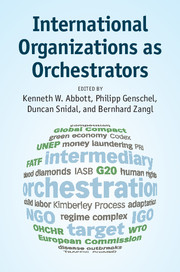Book contents
- Frontmatter
- Contents
- List of Figures
- List of Tables
- List of Contributors
- Acknowledgments
- List of Abbreviations
- Part I Introduction
- Part II Managing states
- 2 Orchestrating policy implementation
- 3 Orchestration on a tight leash
- 4 Orchestration by design
- 5 Efficient orchestration?
- 6 Orchestrating monitoring
- 7 Orchestrating enforcement
- Part III Bypassing states
- Part IV Implications
- References
- Index
3 - Orchestration on a tight leash
state oversight of the WTO
Published online by Cambridge University Press: 05 April 2015
- Frontmatter
- Contents
- List of Figures
- List of Tables
- List of Contributors
- Acknowledgments
- List of Abbreviations
- Part I Introduction
- Part II Managing states
- 2 Orchestrating policy implementation
- 3 Orchestration on a tight leash
- 4 Orchestration by design
- 5 Efficient orchestration?
- 6 Orchestrating monitoring
- 7 Orchestrating enforcement
- Part III Bypassing states
- Part IV Implications
- References
- Index
Summary
Abstract
While orchestration seems to be on the rise in a number of international organizations, the WTO is today largely absent when it comes to applying orchestration tools. This was not always the case. In this chapter I analyze the low (but varying) degrees of orchestration across WTO activities and over time. After discussing the use of orchestration techniques in several areas of WTO activities, the chapter focuses on the negotiation function. I discuss three variables (goal divergence, state oversight and entrepreneurship) and put forward an explanation as to how these interact to account for the degree of orchestration observed. I argue that goal divergence is the most important explanatory variable, as it causally affects state oversight and entrepreneurship. In the empirical section, the chapter discusses evidence drawn from orchestration processes during the Uruguay Round negotiations in relation to endorsing international norm-setting organizations (e.g., Codex Alimentarius Commission and International Organization for Standardization). It further shows how “endorsement” attempts have evolved with respect to these organizations over time. Finally, I discuss a more recent case, the so-called Friends of Fish initiative, to illustrate how goal divergence leads to greater oversight and therefore less entrepreneurship.
Introduction
While orchestration is on the rise with respect to a number of international organizations, the WTO makes little use of orchestration tools. This chapter aims to contribute to a better understanding of the obstacles to orchestration and the conditions under which orchestration may emerge in the WTO (and in similar intergovernmental organizations that are reluctant to orchestrate).
- Type
- Chapter
- Information
- International Organizations as Orchestrators , pp. 65 - 87Publisher: Cambridge University PressPrint publication year: 2015
- 4
- Cited by



